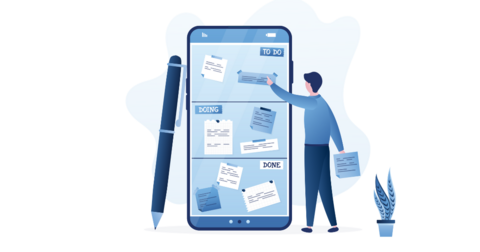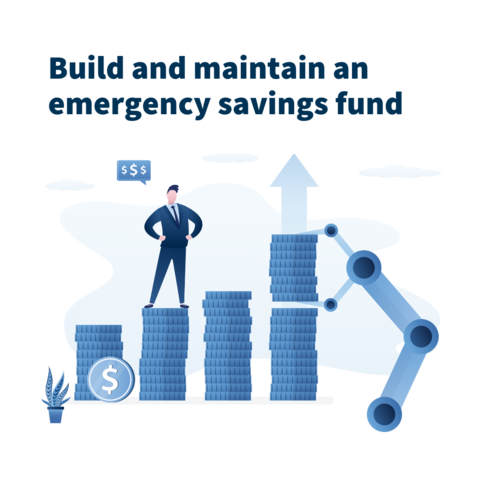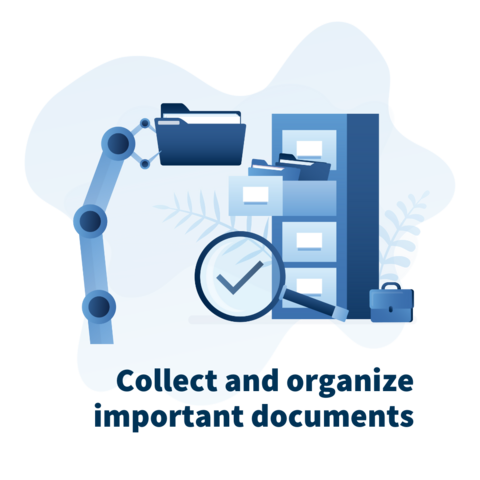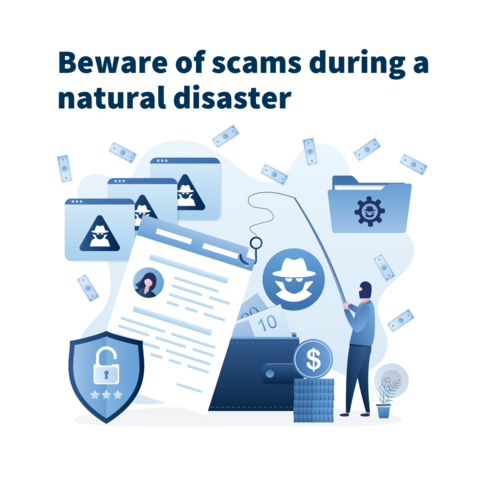Suggestions for having a plan

Many people think of disaster preparedness as having a stockpile of water, canned food, and flashlights, but you also need access to cash and financial services. That’s why it is important to include financial preparedness in your disaster plans. Here is a summary of financial-related suggestions to consider including in your disaster preparedness plan.
Periodically review your hazard or renters insurance coverage
Determine if you have enough insurance coverage to replace or repair your home, car and other valuable property, as well as temporary housing if you are displaced from your home. Those who do not own a home may want to consider renters insurance. Also, make sure that you have the right kind of coverage for the types of disasters likely to occur in your area. For example, homeowner’s insurance does not typically cover events such as flooding or earthquakes, so you may want to consider whether you need additional coverage.

Build and maintain an emergency savings fund
While your personal hazard insurance should cover most or all of the damage to your home and property, an emergency savings fund can provide for immediate expenses and help fill the gaps. FDIC’s How Money Smart Are You? can help you create an emergency savings plan.
Bank availability during a natural disaster
Banks may need to temporarily limit operations because of a natural disaster’s impact on a physical bank branch. This might include closing a lobby, converting to drive-thru only services, or encouraging customers to use ATMs or digital channels to access their services. Consider your digital banking options by reading Banking with Third-Party Apps, which was an article in the June 2024 edition of FDIC Consumer News. Also, taking care of simple things like receiving and depositing a check can be overwhelming during a natural disaster. Direct deposit will help you avoid missing out on important income during a disaster. Regardless of the operating conditions, deposits in an account at an FDIC-insured bank or savings institution will continue to be insured in the unlikely event of a bank failure, to at least $250,000 per depositor, per FDIC-insured bank, per ownership category. Please see additional information regarding FDIC deposit insurance.
Collect and organize important documents

Consider collecting the following types of important documents to store in a safe place:
- Originals and copies of your identification such as a driver’s license, passport, Social Security card, and birth certificate. These are helpful if you must prove your identity. It is best to have originals, but copies are also useful if the originals are lost or destroyed.
- Contact information (including phone numbers and websites) for your banks, brokerage firms, and insurance companies.
- Copies of your financial information such as credit and debit cards (front and back) and checks (front). During a disaster, you may need this information to authorize payments.
- Current insurance policy information for homeowner/renter, auto, and life insurance coverages.
- Originals and copies of medical information, such as insurance cards and health records.
- An inventory of valuable personal property. Document the value of the items by keeping receipts and/or written appraisals, and perhaps photos.
Suggestion on ways to store your information
Emergency evacuation bag: Along with personal safety items in your bag, you should include copies of some of the important documents listed earlier. Large amounts of cash may be deposited at an FDIC-insured bank; however, you might consider keeping a small amount of cash to purchase food or supplies, in case ATMs and credit cards are not working. Make sure to keep your evacuation bag in a secure and accessible place for a quick exit.
Digital storage: Most documents can be kept electronically. When deciding which documents to keep digitally, consider how to access the documents using your smartphone or a computer. Encrypt sensitive documents and set your electronic device security to require a password, your thumbprint, or facial recognition for additional safety.
Safe deposit box at your bank: This may be an appropriate location for documents that are difficult or impossible to replace, and that you do not need to access frequently. Because most safe deposit boxes are not waterproof, you might also seal these items in waterproof bags or containers in case of a flood or other water damage.
Financial difficulty
If you do not think you can make your loan payments on time due to a natural disaster, immediately contact your lender. Paying your debts late or missing a payment can result in penalties, interest charges, and damage to your credit score. It is important to contact your lender as soon as possible to explain your situation. Your lender should be able to work with you on a solution.

Beware of scams during a natural disaster
Dealing with a natural disaster is difficult enough. Fraudsters can make matters even worse by trying to take advantage of these situations to steal money and valuable information. If you are a disaster victim, be careful about accepting unsolicited offers to make repairs or provide assistance. It is especially important to avoid offers that pressure you to act quickly.
Sometimes fraudsters pretend to be representing a charitable organization, so be sure to only deal with charities you are familiar with or have researched thoroughly. Some fraudsters attempt to use the name of a reputable charity and then attempt to direct you to a fake website to steal money and financial information. Do not release your personal or financial information unless you are certain that the lender, entity, or person with whom you are dealing is legitimate.
Additional Resources
Department of Homeland Security (DHS), Distasterassistance.gov
Small Business Administration (SBA), Disaster Assistance
For more consumer resources, visit FDIC.gov, or go to the FDIC Knowledge Center. You can also call the FDIC toll-free at 1-877-ASK-FDIC (1-877-275-3342). Please send your story ideas or comments to ConsumerEducation@fdic.gov. You can subscribe to this and other free FDIC publications to keep informed!
